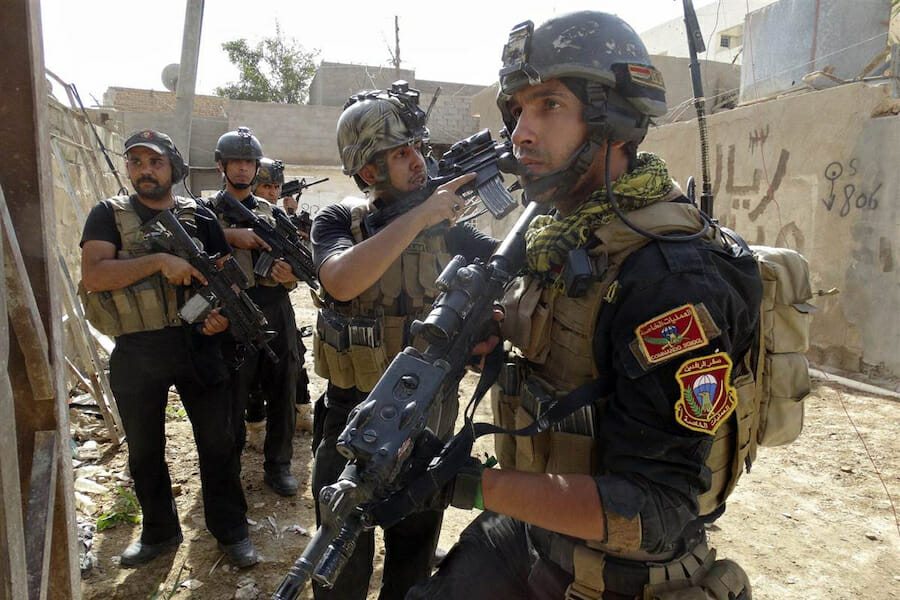
Let Iraq Fail
As enemy columns began a long, arduous advance to the capital, city after city and town after town fell. With a phased American pull out that left not a single combat troop in the country, U.S.-equipped and trained local forces began to melt away, a combination of tactical defeats, surrenders, desertions, and mutinies. The outlook of reengagement looked even bleaker: more involvement in the longest war to have ever been fought in American history was a politically unpopular and untenable position.
Realizing the grimness of the hour, the president boldly addressed a crowd in New Orleans with reassurance. “These events, tragic as they are, portend neither the end of the world nor of America’s leadership in the world,” the Commander-in-Chief began. He continued: “Let me put it this way if I might. Some tend to feel that if we do not succeed in everything everywhere, then we have succeeded in nothing anywhere. I reject categorically such polarized thinking. We can and we should help others to help themselves. But the fate of responsible men and women everywhere, in the final decision, rests in their own hands, not in ours.”
These words are not those of President Obama on the deteriorating situation in Iraq today, but the fateful words of President Gerald Ford as North Vietnamese troops advanced precariously into the heart of South Vietnam a week before the fall of Saigon. Ford’s words are just as true today as they were nearly forty years ago, though. Prime Minister Nouri al-Maliki’s government in Iraq has formally asked the United States to authorize airstrikes in their defense against ISIS militants. This government’s response ought to be simple: no.
The options for re-engagement in Iraq have fallen into three broad categories (though they are not mutually exclusive).
First, a military intervention using airstrikes and/or special forces on the ground to push back ISIS militants, secondly a political solution to force Prime Minister Maliki to resign and bring about a more cross-sectarian government to block the thrust of ISIS-appeal, and lastly a geopolitical solution in line with that suggested by Vice President Joe Biden to partition the state into Sunni, Shia, and Kurdish sectors. All three are ultimately ill-advised for the United States.
The first involves, as former Commander of U.S. forces in Iraq General David Petraeus argues, America optically being the “air force for Shia militants.” Support for the status-quo government will increase sectarian tensions and blowback against the United States. Further, supporting the Shiite-dominated militia and government in Iraq and attempting to militarily quash the Sunni insurgency could serve to extend Iranian power and influence in the region.
The second option evokes a potentially untenable path in the future. Having a foreign power attempt to dislodge a sitting government and negotiate with opposition parties to undermine the head of state’s influence ultimately presents its own political instability to the region. Will this be the indefinite policy of the United States? Surely, Iraq will have future conflicts – will the expectation be that the United States will strong-arm governments until the ruling faction leaves? A multifold implication of this course of action would be weakening the resolve of Shiite volunteers defending the state, leading to a potential second insurgency, and creating a vacuum in government that results in the new coalition that comes to leadership being weakened by infighting and an emboldened Maliki on the fringes of power-seeking a return.
The last solution involves the downsides of the second – namely, U.S. intervention in internal political processes to whip up the votes for a partition while fracturing the pre-existing governing coalitions – while also mandating further U.S. intervention. Who will enforce the peace between three separate states? The Iraqis themselves (we’ve seen how that goes)? The Iranians (which would undeniably represent a conflict of interest)? The United Nations (are that many nations ready to volunteer their soldiers to enforce a DMZ between three militant and hostile nations)? Will U.S. forces return? This isn’t even taking into consideration the fact that Baghdad is divided between Sunni and Shia neighborhoods that could see potentially deadly conflict.
Which leads us to the question: why not do nothing? There have been three nebulous threats that have been suggested that makes this course supposedly-reckless: oil, terrorism and the perception of U.S. power. First, let’s tackle oil. Many have speculated of the harms as ISIS militants seize the “largest oil refinery in Iraq.” Two things: A) Iraq accounts for, according to the U.S. Energy Information Administration, roughly 3% of U.S. crude oil imports. Perhaps significant, but willing to invest large amounts of U.S. political clout and military power to defend? Hardly. B) This number doesn’t even account for the fact that U.S. imports of oil have been dropping annually for the past 6 years. The U.S. imports 25% less crude than in 2008, largely the result of an energy boon driven by natural gas, meaning that the influence of Persian Gulf oil-production capabilities will diminish even more as time goes on.
Risking U.S. involvement to defend such a stream seems hardly like a slam-dunk. Secondly, the argument that Iraq will turn into a hot-bed of terrorism if we intervene is also tenuous. It presupposes that the United States will always be the prime target of Sunni (or Shia, for that matter) extremists. Which is true, if we’re directly involved in a conflict against the other – but isn’t if we’re disengaged. A radical Sunni network of terrorism will continue to exist, as well Iranian-backing of Shiite forces, meaning it’s hardly the case that one side will come to dominate the whole of Iraq and use it as a staging ground for terrorist strikes.
More importantly, if the United States is not offering overt and covert support against a particular sectarian faction, this diminishes the focus these groups place against the United States compared to their immediate and more pressing adversaries (for Sunni militants, Bashar al-Assad in Syria, Maliki’s Iraq and the Iranian regime present far more enticing and vital concerns than using a finite amount of resources to plan and stage attacks against the U.S.)
Finally, though, many have argued that the United States will possess less international legitimacy if Iraq is abandoned. However, such an argument was also used to continue American intervention in Vietnam in perpetuity. Though, it is difficult to find an impact of U.S. withdrawal from Vietnam on foreign policy: the decade of Vietnamization and withdrawal saw a thawing of relations with China, détente with the Soviet Union and the negotiating of the Camp David Accords, all while the diplomatic power of the U.S. was supposedly diminished as a result of allowing Vietnam to slip into the abyss.
Whether Iraq survives or fails in the ensuing conflict (that may be more aptly labeled a civil war now) remains to be seen. Some, such as former Army Vice Chief of Staff Peter Chiarelli have claimed ISIS forces lack the ability to penetrate Baghdad. Ultimately, though, the outcome of this conflict is not America’s interest. 8 years claimed $2 trillion, and 4,500 U.S. lives (neglecting to mention the large number of injured veterans who, to add salt to the wound, have been put on waiting lists by the Veterans Administration in recent years.) The United States will continue to exist as the world’s most powerful military and political power, regardless of if the new Iraqi government survives.
Indeed, U.S. power may ever be strengthened when the benchmark rivals use to measure American power is not the ability to prop up a failing and corrupt state splintering at the seams. Continuing to fight and re-fight the Iraq War in a quest to do the work for the Iraqis of preserving a democratic government will ultimately necessitate greater U.S. involvement and will never result in a final solution to the region’s problems. President Ford was right in his assessment of Vietnam in 1975 and the logic should be applied to Iraq today: the final decision rests in the Iraqis’ hands, not ours.

